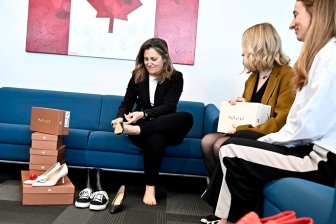Reopening schools during the coronavirus pandemic has challenged administrators to come up with thorough processes by which to disinfect the buildings.

Regina Public Schools released the details of its new cleaning plan on Tuesday.
“It’s a very different year. It’s a year that none of us have ever, ever encountered before. We are doing everything we can to ensure that the schools are as safe as possible,” said Regina Public Schools communications supervisor Terry Lazarou. “We will strive to keep our parents informed of everything that’s going on.
The school division — which includes 44 elementary schools, eight high schools, three faith-based associate schools and an adult campus — plans to disinfect its buildings at least every 24 hours using a solution called Vital Oxide.
The Health Canada-approved compound is child-friendly and safe, said Regina Public Schools operations manager Henry Funke, adding that although personal protective equipment is not necessary, the school division is recommending masks and gloves be worn while working with it.
Regina Public Schools has purchased Graco SaniSprayers to dispense the solution. Most of the units are trigger activated hand-helds that can output up to 20 ounces of Vital Oxide per minute. In some of the larger high buildings, there are larger machines on carts with hoses that can output up to 65 ounces per minute.
Vital Oxide, once sprayed and left to dry for 10 minutes, can kill coronavirus, according to Health Canada.
The school division’s plan is more than just disinfecting. An important component is reducing opportunities for exposure on shared surfaces.
Lockers will be temporarily discommissioned, Lazarous said, and programs like weight training and auto shop are being put on hiatus until further notice.
School schedules are also being changed. Recesses will be before morning bell and after the afternoon bell. Parents are being encouraged to pick up their children as close to those times as possible and avoid congregating. Masks will be mandatory for Grade 4-12 students and are recommended for kindergarten to Grade 3 students.
“We’ll be looking for feedback and, of course, results, about how well schools are doing and then we’ll be flexible about what needs to be done — more or less,” Funke said.

Questions about COVID-19? Here are some things you need to know:
Symptoms can include fever, cough and difficulty breathing — very similar to a cold or flu. Some people can develop a more severe illness. People most at risk of this include older adults and people with severe chronic medical conditions like heart, lung or kidney disease. If you develop symptoms, contact public health authorities.
To prevent the virus from spreading, experts recommend frequent handwashing and coughing into your sleeve. They also recommend minimizing contact with others, staying home as much as possible and maintaining a distance of two metres from other people if you go out. In situations where you can’t keep a safe distance from others, public health officials recommend the use of a non-medical face mask or covering to prevent spreading the respiratory droplets that can carry the virus. In some provinces and municipalities across the country, masks or face coverings are now mandatory in indoor public spaces.
For full COVID-19 coverage from Global News, click here.





Comments